The Year in Review: Celebrating Our Achievements in 2017, Part 1
2017 was a tremendous year of continued growth and progress for UF Health. In this “year-in-review” issue of OTSP, we highlight achievements in each of the colleges. Next week, we’ll do the same for our research centers and institutes, as well as our hospitals.
College of Dentistry
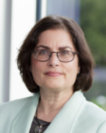 Isabel Garcia, D.D.S., M.P.H.
Dean, College of Dentistry
Isabel Garcia, D.D.S., M.P.H.
Dean, College of Dentistry
The College of Dentistry enjoyed a tremendous year in 2017. We laid the groundwork for a new strategic plan, launched new collaborations within UF Health, implemented a program to enhance patient safety and quality of care, maintained our status as a top-10 dental research institution, hired outstanding faculty, provided care for patients from every county in Florida, and saw many other successes, a few of which are highlighted below.
2018-2022 Strategic Plan
The development of a strategic plan engaged all college audiences — faculty, staff, predoctoral and advanced education students, alumni and leaders at the university and UF Health. Launched in May 2017, the process included working groups that addressed a wide-range of topics, including the challenges and opportunities for dental education, research and care. We are looking forward to unveiling the new plan early this year. It will guide our initiatives and priorities over the next five years and allow us to further enhance the excellence embodied by our college.
Summer Health Professions Education Program
We are pleased to be leading the Summer Health Professions Education Program, or SHPEP, which included all six health colleges working together (with additional support from the VP’s Office of Research and Education) to offer a free, six-week summer enrichment program for students underrepresented in the health professions. Funded as a pilot program in 2017 by the Robert Wood Johnson Foundation, the program allowed 80 college students to explore four main career pathways — dentistry, medicine, pharmacy and public health — with extensive exposure to nursing, physician assistant studies and veterinary medicine. The program aims to help prepare these students to become successful applicants and enroll in health professions schools. Applications for the 2018 cycle are currently being accepted through Feb. 15.
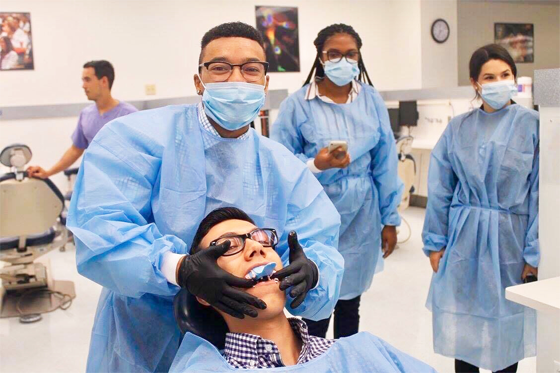
D.M.D. and Graduate Education
Our recent performance on the National Dental Board Examinations Part I and II bears testimony to the quality of our D.M.D. professional educational program. A comparison of dental schools in the U.S. based on mean GPA of admitted students, DAT scores and acceptance rates ranks the UF College of Dentistry No. 9 among 64 dental schools in the U.S.
We added a new master’s degree program in operative dentistry, expanding the already extensive list of College of Dentistry advanced education programs. The program is designed to enhance dentists’ expertise in the areas of operative, digital dentistry and esthetic dentistry, prevention and cariology, as well as to prepare them for future careers in academic dentistry. The college’s graduate education programs continue to attract exceptionally strong applicants, with approximately 18 applicants per slot across all eight residency programs. Our residents won awards at national meetings in multiple disciplines and routinely excel on professional exams after graduation.
Interdisciplinary Education
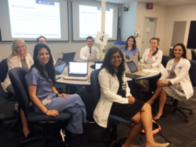 Interdisciplinary educational options continue to grow across all programs. On the predoctoral side, a new Pharmacy/D.M.D. student interprofessional capstone experience began in May 2017. This interprofessional collaboration addresses professional roles and responsibilities, analgesic prescribing, assessing medically complex patients, and acute-care treatment planning using online, standardized patients and peer learning.
Interdisciplinary educational options continue to grow across all programs. On the predoctoral side, a new Pharmacy/D.M.D. student interprofessional capstone experience began in May 2017. This interprofessional collaboration addresses professional roles and responsibilities, analgesic prescribing, assessing medically complex patients, and acute-care treatment planning using online, standardized patients and peer learning.
Residency programs continued to expand inter- and intraprofessional experiences. Joint lectures and case studies now provide residents in Oral Pathology and Oral Radiology an enriched educational experience. The Department of Oral and Maxillofacial Diagnostic Sciences increased its engagement and collaborations with the Department of Oral and Maxillofacial Surgery, jointly publishing in the peer-reviewed literature. The Department of Pediatric Dentistry has grown its collaborations across the College of Dentistry and the College of Medicine. Pediatric residents rotate weekly to the Infant Oral Health Clinic to learn about early signs of early childhood caries. Additionally, through the UF Health Shands Early Steps Program, infants with special care needs are assessed in our clinic with direct collaboration of pediatric medicine.
Our Advanced & Graduate Education programs are increasing interdisciplinary education didactically and at the clinical level with the integration of a team of advanced graduate students. Treatment of immunocompromised patients who require multiple specialties in the operating room at UF Health Shands fosters interdisciplinary education among dental specialties and across specialties in the College of Medicine. Residents in the Department of Oral & Maxillofacial Sciences participate in extensive rotations through various medical services and work with medical attending physicians. The department also works closely with plastic surgery and ENT residents who rotate in our dental practices, as well with attending physicians in medicine, in tumor board and in the craniofacial practice.
Clinical
Through the UF Statewide Network for Community Oral Health, composed of college-owned and partnership practices, our college faculty, students and residents cared for patients living in all 67 Florida counties. In college-owned practices alone, our providers completed 143,176 patient visits, representing an increase of 9 percent over last year. Yearly patient satisfaction surveys in all clinical areas show that our patients value the services they receive: 67 percent of patients rated the overall quality of care as excellent, 26 percent rated it as very good, 5 percent as good and less than 1 percent as fair or good.
The College of Dentistry adopted a modified version of IDinc, already in use by the colleges of Medicine and Veterinary Medicine, to enhance patient safety through development of an electronic system to support tracking and trending of care-related events. IDinc allows more robust ways to monitor, analyze and address patient safety in our dental care centers.
In October 2017, the college began hospitality and service training for faculty, staff, students and residents in a phased implementation with assistance from UF Health trainers. The program, modeled on the UF Health program initiated in 2013, provides a set of standards that urge us all to help create an even more welcoming and hospitable work environment — matter where we work across the school. The program addresses four areas: hospitality, teamwork, communication, and professionalism and responsibility.
Faculty
We successfully recruited 25 new faculty members, adding to the excellent range of experts and specialists. Some, like Cesar Migliorati, D.D.S., M.S., Ph.D., our new associate dean for clinical affairs and quality, are returning to UF having spent time earlier in their careers as students, residents, fellows or faculty. We are pleased to welcome our returning and our new Gator dentists. In 2017, three multi-mission track faculty were promoted to full professor, and two to associate professor. The quality of our dental education program continues to be well-recognized. For example, during the annual 2017 American Dental Education Association meeting, six of the 29 faculty awards (21 percent) were presented to UF faculty. To further acknowledge teaching excellence, we established a new program called “Spotlight on Dental Education.” Awards include Teacher of the Year Awards in Basic and Clinical Sciences, Faculty Exemplary Teaching Awards, Faculty Sustained Exemplary Teaching Awards, Senior Student Teaching Assistant and Tutor Recognition. The first awards were presented in February 2017, with seven faculty receiving a total of nine awards.
Research
Our research enterprise continues to be recognized as one of the best nationally (ranked 7th among all U.S. Schools of Dentistry in National Institutes of Health funding by the Blue Ridge Institute for Medical Research). The College of Dentistry has been in the top 10 in NIDCR funding for the past 15 years. Last fiscal year, the college received more than $17 million in contracts and grants; 73 percent of that was from the NIH. The Comprehensive Training Program in Oral Biology (T90/R90), which builds on 20 years of successful training of basic/clinical scientists, was selected for a national excellence award by the American Dental Education Association. The award will be announced and presented in spring 2018.
College of Medicine
 Michael L. Good, M.D.
Dean, College of Medicine
Michael L. Good, M.D.
Dean, College of Medicine
2017 was an exciting year for the UF College of Medicine. Our faculty family grew to reach 1,425. We recruited nationally prominent leaders to important leadership positions, including Dr. Gilbert Upchurch from the University of Virginia as chair of the UF department of surgery, Dr. Nina Multak from Drexel University as director of the UF School of PA Studies, and Dr. Abel Torres from Loma Linda as chair of the UF department of dermatology.

 Building on the success of our annual weeklong Celebration of Research (February) and Celebration of Education (March), the college held its inaugural Celebration of Diversity in April. Guest speakers made presentations to collegewide audiences and also at department grand rounds, providing insightful and informative perspectives on diversity and related topics such as implicit bias. The Celebration of Diversity week culminated with the Emerald Ball and a moving presentation from featured keynote speaker Dr. Freeman Hrabowski III, president of the University of Maryland, Baltimore County.
Building on the success of our annual weeklong Celebration of Research (February) and Celebration of Education (March), the college held its inaugural Celebration of Diversity in April. Guest speakers made presentations to collegewide audiences and also at department grand rounds, providing insightful and informative perspectives on diversity and related topics such as implicit bias. The Celebration of Diversity week culminated with the Emerald Ball and a moving presentation from featured keynote speaker Dr. Freeman Hrabowski III, president of the University of Maryland, Baltimore County.
Research funding awards from the National Institutes of Health to the UF College of Medicine faculty hit a historic high in 2017, crossing the $100 million of research awards level for the first time in the 60-year history of our medical school. The impact of our faculty's work, for example, in working to discover the molecular-genetic underpinnings of ALS and Huntington’s disease, or conducting first-in-human clinical trials in immunotherapy for brain cancer and gene therapy for muscular dystrophy, are truly impressive.
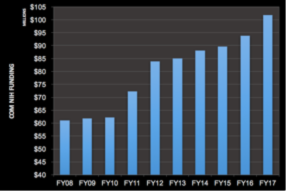
Our UF medical education programs are extraordinary. In 2017, 88 percent of our UF medical school graduates entered residency training programs at top 50 medical schools, and 24 percent were selected for residency training at programs associated with top 10 medical school. Our physician assistant graduates achieved a 100 percent pass rate on their national examination, and our UF School of PA Studies received its first-ever 10-year reaccreditation. Our graduate education program continues to be reshaped, with a focus on “fast track” pathways to mentors and laboratories for graduate students with declared concentrations.
Alumni and friends continue to support our UF medical school with their time, expertise and philanthropy. UF kicked off the public phase of its $3 billion Go Greater comprehensive campaign, and the College of Medicine remains on track to achieve its goal with a focus on student scholarships. Our alumni President Dr. Jim Duke and the Medical Alumni Board are spearheading the “Legacy Challenge” as part of the “Their Future, Your Legacy” scholarship campaign, which is working to establish 100 new scholarships for our medical and PA students in our college.
More and more patients continue to seek care at UF Health. By the numbers, in 2017, hospital admissions increased to 50,734, surgical procedures to 37,010, physician ambulatory practice visits to 888,749 and emergency department visits to over 120,000. Our UF Health quality scores improved, with significant reductions in catheter-related infections, and our risk-adjusted in-hospital mortality continues to be very low, currently 21st best in the nation. We ended the 2017 year with the December opening of our beautiful new Neuromedicine and Heart and Vascular hospitals, which in addition to over 200 new single patient rooms, include leading-edge surgical and procedural facilities, state-of-the art diagnostic equipment and integrated physician ambulatory practices sites. These new facilities will allow our faculty and clinical teams to offer even more advanced care to the growing number of patients afflicted with challenging neurological, cardiac and vascular diseases.

While we often describe our success in terms of numbers, the national rankings, the research funding, the placement of our graduates or the size of our hospitals, it’s really not about the numbers. It’s about human lives improved, and in 2017, there were so many. Thank you for making this difference possible. 2017 will go down as one of our best years ever in the history of the UF College of Medicine.
College of Medicine - Jacksonville
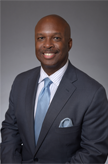 Leon L. Haley Jr., M.D., MHSA, FACEP, C.P.E.,
Dean, College of Medicine – Jacksonville
Leon L. Haley Jr., M.D., MHSA, FACEP, C.P.E.,
Dean, College of Medicine – Jacksonville
Leon L. Haley, M.D., MHSA, FACEP, C.P.E., was named dean of the College of Medicine – Jacksonville and vice president for health affairs on Jan. 4, 2017. Dr. Haley spent 20 years in Atlanta at the Emory University School of Medicine and the Grady Health System in various roles, including chief of emergency medicine, deputy chief medical officer and, most recently, executive associate dean for Emory at Grady. In September, the Board of Directors of UF Health Jacksonville approved the appointment of Dr. Haley to assume the additional title of CEO of UF Health Jacksonville in January 2018.
Education
The education programs continue to excel. The College of Medicine – Jacksonville has 287 residents and 70 fellows in accredited programs in 12 clinical departments and an additional eight fellows in clinical non-accredited programs. Two newly accredited programs were added this past year — a fellowship in child and adolescent psychiatry and an integrated diagnostic and vascular interventional radiology residency. All programs are currently accredited and the campus has been successful in incorporating the ACGME model for training oversight (“Next Accreditation System”). The Office of Educational Affairs has fully implemented new requirements for annual program reviews via the Committee on Annual Program Evaluation Review.
An emphasis of the recently revised common program requirements is physician well-being. To address the new requirements and provide a supportive environment for trainees and faculty, a wellness taskforce, comprising faculty, residents and other staff, has been created. This group is reviewing programs that are currently in existence and is preparing a comprehensive program for our campus.
The University of Florida College of Medicine continues to incorporate the Jacksonville campus as a training site for its students, with all medical students completing clinical rotations in Jacksonville (equivalent to 25 to 30 percent of the academic year on average for MS3s). For 2017 this was accomplished via 476 MS3 rotations, 134 MS4 rotations and 111 PA student rotations. In addition, the college hosted 190 non-UF College of Medicine MS4 students during the year. With full-time UF Nursing and Pharmacy students on the Jacksonville campus as well, the educational experience and opportunity for interprofessional training is exceptional, and includes several ongoing initiatives utilizing the simulation center.
The College of Medicine – Jacksonville’s long-standing program for training faculty to be excellent teachers continues through faculty development seminars that focus on faculty skills in student evaluation, feedback and teaching in an environment with limited flexible and discretionary time. To further enhance the teaching skills of our faculty, the Office of Educational Affairs introduced an educational development certificate that is awarded to faculty who participate in 10 educational faculty development sessions over the course of a two-year period of time.
Faculty
At present there are a total of 427 faculty, 15 new faculty with January through September 2018 hire dates, and new budgeted openings for an additional 36 positions for which there is active recruitment. Current faculty include 285 assistant professors, 64 associate professors and 41 full professors on the multi-mission track; four assistant professors, seven tenured associate professors and 22 (20 are tenured) full professors on the tenure track; and one each of research assistant professor, research associate professor, assistant scientist and lecturer.
In July 2017, the UF College of Medicine – Jacksonville promoted six faculty members to clinical professor and three faculty members to clinical associate professor. At present there are 11 faculty nominated for 2017-2018 promotion cycle — seven faculty to clinical associate professor, three faculty to clinical professor and one tenured faculty to professor. Promotion results are announced by the university at the end of the academic year. There was active recruitment for several department chairs in Radiology, Ophthalmology and the newly created Department of Urology. The college was pleased to announce that Dr. Chandana “Sandy” Lall from the University of California -Irvine accepted the appointment of radiology chair and will officially begin in May 2018.
Practice Plan (University of Florida Jacksonville Physicians Inc.)
During this calendar year, the Faculty Practice Plan further refined its organizational structure with the recruitment of Dr. Pradeep V. Kadambi, M.D., M.B.A., into the position of senior associate dean for clinical affairs and president/chief executive officer of UFJPI. The dual title of this position reflects the essential intent to align the clinical practice and academic mission with the strategic direction of the UF Health clinical enterprise. Dr. Kadambi came to us from the University of Arizona, where he was the director of solid organ transplantation and chief clinical affairs officer of Banner—University Medical Group, Tucson, a 620 member academic multispecialty physician group. He started his position on Oct. 2d. The VPs for Ambulatory Services (Ms. Rita James), Finance (Mr. Tim Reinschmidt) and Operations (Mr. Richard Scanu) complete the simplified leadership structure.
The practice plan finished another strong year (FY2017) with a positive margin of $5.1 million. After the faculty (earned incentives) and staff bonuses were paid at Dean Haley’s approval, $1.4 million was transferred to reserves.
As Jacksonville’s premier academic health center and safety net institution, our payor mix has always been a challenge. However, in the recent years we have made an intentional effort to improve it. Some of the strategies we have focused on have included:
- Opening the new UF Health North Hospital
- Leveraging our extensive primary care network to gain net new patients
- Improving access to care (both primary and specialty care)
As a result, our commercial and Medicare volumes have significantly improved, particularly at our satellite clinics.
The “MyChart” program, continues to be a big “winner” with patients and physicians providing access and information via the Epic. To date, 56,242 unique patients have signed up for, and are actively using, this tool. A new feature of this portal is the ability for patients to receive and pay physician and hospital bills. This represents about a third of our practice, and we still have a lot of opportunity. Comments are consistently very positive. We will also upgrade Epic to the 2017 version in May 2018.
The practice plan will invest strategically and work closely with UF Health leadership to recruit specialists and subspecialists over the next few years, not only to meet the demands of our extensive primary care network but also to grow our elective surgeries/procedures, solidify our academic footprint and establish our leadership in Northeast Florida.
Research
The College of Medicine – Jacksonville continues to grow its research activities. In academic year 2017, total funding via all contracts and grants was $21.5 million, of which 70 percent was from federal sources. The College of Medicine was excited to announce three major grants awarded to faculty that will be housed on the Jacksonville campus. Dr. Dominick Angiolillo is serving as the PI of the Jacksonville-dedicated center focused on aging research on racial minorities and low socioeconomic status older adults, as part of the $3.6 million NIH award to Dr. Marco Pahor for JAX-ASCENT (the Jacksonville Aging Studies Center). Dr. Grewal Renu was awarded a $2.3 million grant from the CDC to study Improving HIV Care through Telemedicine; in addition, Dr. Nipa Shah , co-PI, and Dr. Carolyn Tucker, PI, were awarded a $2.1 million grant from PCORI to study the impact of community health workers on reducing obesity in African-American females. The project will be implemented in 20 Jacksonville primary care clinics. Additionally, Phyllis Hendry is the Jacksonville PI in a first-of-its-kind national initiative to improve the understanding, prevention and recovery of soldiers and civilians who have experienced a traumatic event. The study is funded by NIH and included research teams from the University of North Carolina and Harvard University. The five-year funding from NIH for this project is $21 million, in addition to funding by private foundations.
The college continues to search for a new senior associate dean for research based in Jacksonville to further enhance research on the Jacksonville campus, especially in collaboration with the colleges of Nursing and Pharmacy.
Clinical Services
Clinical volumes continue to grow at UF Health North, at the main campus, the Emerson extension and the widely dispersed primary care system. The College of Medicine – Jacksonville primary care network provides access to faculty physicians in over five Northeast Florida counties and two Southeast Georgia counties. This system makes the college very competitive in Northeast Florida for managed care and managed risk contracts, as it allows easy access to patients over more than 1,400 square miles in Southeast Georgia and 3,200 square miles in Northeast Florida.
For FY 2017, the total number of clinic visits was 621,155 (excluding ancillary imaging or rehabilitation services). The breakdown includes:
- Primary Care — 354,207 (57 percent)
- Specialty Care — 271,948 (43 percent)
- (Ob/Gyn at 51,382 and Medicine Specialties (excluding General Internal Medicine) at 48,058 represent the highest numbers behind primary care.
- Off-campus clinic visits — 420,154 (68 percent)
- On-campus visits — 206,001 (32 percent)
UF Health North (included in the total) — 44,066 (7 percent)
- Cardiology — 4,867
- Orthopedics — 4,475
- Ob/Gyn — 4,411
In June, along with the University of Florida, UF Health Jacksonville and the University of Florida Jacksonville Physicians Inc. were awarded the Healthcare Strategic Alliance with Raydient Places+Properties after a competitive bidding process against several other local health care systems. “Wildlight,” as the property is officially known, will ultimately encompass 25,000 square acres of property in Nassau County with 24,000 housing units, and we will be their health and wellness partner. Initial plans to build a 40,000-square-foot ambulatory building for primary care, urgent care and imaging and 35,000-square-foot building that will encompass the county’s first YMCA started in late 2017 and will progress throughout 2018, with a goal of completion in the summer of 2019.
In closing, we want to highlight that our Ear, Nose and Throat program ranked 37th nationally in the report published by U.S. News in 2017. Successes such as these could not have been possible without our hard-working faculty, residents and staff. We will to continue to work toward a brighter future and together we will get there — we will reach our vision of being the region’s Most Valuable Healthcare Asset!
College of Nursing
 Anna M. McDaniel, Ph.D., R.N., FAAN
Dean, College of Nursing
Anna M. McDaniel, Ph.D., R.N., FAAN
Dean, College of Nursing
After celebrating our 60th anniversary in 2016, the College of Nursing turned the page in 2017 and embarked upon yet another successful year in nursing education, research, leadership, scholarship and service in Gainesville, Jacksonville and at our nurse-managed clinic, Archer Family Health Care. In the midst of all of the highlights of the past year, including the kickoff of the university’s Go Greater capital campaign, we challenged ourselves to think strategically and innovatively as we began the process of drawing up our college’s next strategic plan, designed to push UF Nursing to even greater heights in the future.
We’ve defined 10 core values as we charge forward, and established our vision to transform health care through innovative practice, preeminent research and exceptional academic programs; our mission is to provide excellent personalized nursing care, generate research and scholarship that have an impact on practice, and prepare graduates who care, lead and inspire.
2017 Highlights:
Administration and Operations
- As we Go Greater and embrace the power of together for the future, we’ve identified five initiatives for the college through the comprehensive campaign: the Center for Palliative Care Research and Education, Innovation and Learning, Archer Family Health Care and faculty and graduate student support.
- Several leadership changes occurred within the college — we’re proud to have Dr. Versie Johnson-Mallard as our new associate dean for student affairs, and two new department chairs: Dr. Ann Horgas in the Department of Biobehavioral Nursing Science, and Dr. Gail Keenan in the Department of Family, Community and Health System Science.
- We implemented a new shared governance structure and processes after revising the faculty bylaws and governance in 2016 to make faculty responsibilities more efficient and inclusive.
- We engaged in crucial conversation around academic freedom and educational responsibility.
- We successfully initiated new performance evaluations focused on faculty achievement and development.
- We encouraged, supported and provided faculty and staff development programming on Innovation and Entrepreneurship.
- We hosted the Rita Kobb Nursing Informatics Symposium, a lectureship that explores topics in nursing informatics. This year the lectureship was expanded to a national symposium with the theme, “Precision Health: The Intersection of Nursing Practice and Data Science,” which encompassed topics that explored informatics, how precision health can improve patient care, the latest trends involving data science and nursing informatics.
- We continued to raise the visibility of the excellence and expertise of our faculty and students — we successfully recruited nine new faculty members and one highly qualified new administrative program director in 2017.
- The College of Nursing secured more than $2 million in private support in fiscal year 2017. These gifts will enhance unrestricted, faculty, student and research support. In the fall, the college kicked off the Snider-Irving Legacy Challenge and has already documented six new planned gifts and three bequest upgrades. In addition, we currently have 17 new leads for planned gifts to close by fiscal year end.
- The Go Greater Campaign launched in October, and as of Dec. 31, the College of Nursing has already raised $2 million of its $2.9 million goal for current fiscal year 2018.
Education
- Collaborating on the college’s next strategic plan wasn’t our only large undertaking as it relates to transforming the future of UF Nursing; with a tremendous amount of time, effort and dedication from our faculty, we are on the home stretch of transforming our undergraduate Bachelor of Science in Nursing curriculum to implement in Fall 2018, with the goals of enhanced student outcomes, faculty scholarship and bolstering our national reputation.
- We initiated our holistic admissions process to recruit, prepare and graduate highly qualified students who demonstrate the experiences, attributes and academic metrics to become successful professional nurses.
- Our Doctor of Nursing Practice program received 10-year accreditation from the Commission on Collegiate Nursing Education, and was once again ranked by U.S. News & World Report as the top-ranked program in the state of Florida and among the top 25 public nursing schools.
- We implemented a revised Ph.D. curriculum, and implemented initiatives to increase Ph.D. enrollment through strategic recruitment and advertising.
- We received one of 31 prestigious Future of Nursing Scholars grants from the Robert Wood Johnson Foundation to provide financial support, mentoring and leadership development for two Ph.D. students.
- We graduated our first Accelerated Bachelor of Nursing Science cohort from the Jacksonville campus.
- We engaged in new initiatives for faculty development centered on curriculum, evidence-based pedagogy and simulation.
- We continued our commitment to diversity and inclusion under Dr. Jeanne-Marie Stacciarini with our EMBRACE Program — Engaging Multiple communities of B.S.N. students in Research and Academic Curricular Experiences. We welcomed our second cohort of EMBRACE students in 2017, while Stacciarini received university wide recognition from UF Multicultural and Diversity Affairs for her exceptional leadership in fostering diversity and inclusion on campus and in the Gainesville community.
- We hosted the first cohort of UF Health’s Summer Health Professions Education Program, or SHPEP, encompassing all six academic health colleges. Funded by a grant from the Robert Wood Johnson Foundation and in-kind donations from all six units, the program enabled 80 underrepresented and minority students to take part in the free six-week summer residential program at UF designed to facilitate interest in, successful application to and matriculation into health professions education.
- Developed a teaching mission for our new strategic plan to “inspire graduates who deliver excellent personalized nursing care, provide leadership to the profession, and advance nursing science”
Research
- In 2017, the College of Nursing’s NIH ranking for research funding moved up 20 places from 56 to 36, which represents a 29 percent increase in federal funding. The college is in the top 25 among public universities nationally.
- Our scholarship metrics are consistently above the 75th percentile in indicators of scholarly productivity, ranking 10th in grants per faculty member for our Department of Biobehavioral Nursing Science, and 13th in dollars per grant for our Family, Community and Health System Science faculty.
- We established the Center for Palliative Care Research and Education under the leadership of Dr. Diana Wilkie, an internationally recognized cancer pain researcher and the Prairieview Trust-Earl and Margo Powers Endowed Professor.
- We emphasized our commitment to advancing team science within the College of Nursing, while continuing our cross-disciplinary collaborations with areas such as the Clinical and Translational Science Institute, the Institute on Aging, the UF Health Cancer Center, PRICE (pain research), Biomedical Informatics and the Institute for Latin American Studies.
- We crafted a mission for research and scholarship under our new strategic plan to “improve health and advance nursing science through nationally recognized programs of research and scholarship.”
Practice
- Archer Family Health Care continues to provide access to primary care for rural, underserved patients. AFHC now serves 1,500 patients and has 6,000 annual visits. Ninety-seven percent of our patients reported high levels of satisfaction, with ease of scheduling, courtesy of staff and feeling listened to as top compliments.
- As of Dec. 31, 2017, Archer Family Health Care received distinguished recognition, earning NCQA Patient Centered Medical Home Recognition. One in six primary care physicians in America practices in an NCQA-Recognized practice, and ours is among an elite group that has demonstrated its commitment to advancing quality in health care.
- We continued to demonstrate excellent quality metrics across the spectrum at AFHC, including preventive care, patient education, immunization rate and clinical indicators. The nurse-led interprofessional care team model to improve outcomes, increase patient satisfaction and decrease costs has become a national model, and includes mental health services, the addition of pharmacy services and a nursing case manager.
- We strengthened our partnerships with service in terms of College of Nursing participation on practice councils and committees, and our Doctor of Nursing Practice projects on clinical units.
- We enhanced our visibility in the community with volunteer work in community clinics and participation in Alachua County’s flu shot program.
- We continued to receive strong commitment from practice partners at UF Health in Gainesville and Jacksonville, as well as the VA, including our collaborative Academic Partnership Unit endeavors for clinical care for our nursing students.
- We developed a new practice and service mission in our strategic plan to “deliver high-quality, value-based personalized nursing care to vulnerable populations through innovative practice models that influence health policy and social justice.”
College of Pharmacy
 Julie A. Johnson, Pharm.D.
Dean, College of Pharmacy
Julie A. Johnson, Pharm.D.
Dean, College of Pharmacy
In 2017, the University of Florida College of Pharmacy enjoyed an incredible year of growth and prosperity that further strengthened our position as one of the nation’s Top 10-ranked pharmacy colleges by U.S. News & World Report. Under the leadership of Dean Julie Johnson, Pharm.D., the college attained a record amount of research funding, claimed numerous national awards and expanded our clinical services to impact more patients than ever before.
Educational Achievements
Students in the Doctor of Pharmacy program continue to excel and advance through the college’s new curriculum, which was introduced in 2015. Now in Year 3 of implementation, the curriculum features interdisciplinary faculty teams teaching the next generation of pharmacists using team-based learning strategies in a flipped classroom format that emphasizes patient-centered care. A co-curriculum provides students with skills to enhance self-awareness, interpersonal communication, advocacy and leadership.
Educational highlights for 2017:
- 313 graduates of the Pharm.D. program, including 24 graduates from the working professional Pharm.D. program.
- Top college in the nation placing students into postgraduate residencies.
- 20 Ph.D. graduates, four residential M.S. graduates and 207 M.S. graduates from online programs.
 Student organization award highlights for 2017:
Student organization award highlights for 2017:
- UF’s chapter of the American Pharmacists Association Academy of Student Pharmacists, or APhA-ASP, won the national chapter of the year award. The UF chapter has nearly 600 student pharmacists, and APhA-ASP is the largest student pharmacist organization in the nation.
- Four of the 100 total United Nations Foundation inaugural class of Global Health Fellows were from the College of Pharmacy, selected from universities and various disciplines across the United States.
- The UF College of Pharmacy ranked among the Top 5 pharmacy colleges nationally, with 46 students presenting posters at the American Society of Health-System Pharmacists, or ASHP, Clinical Midyear Meeting in Orlando, Dec. 3-7.
- UF led the nation with presidential trainee awards at The American Society for Clinical Pharmacology and Therapeutics, or ASCPT, with six winners.
- Orlando campus students received the inaugural national award from the U.S. Public Health Service and Interprofessional Education Collaborative for a collaborative health care clinic for uninsured farmworkers in Apopka.
- The Beta Beta Chapter (Orlando campus) of the Kappa Epsilon professional pharmacy fraternity received the national Outstanding Chapter Award for 2016-17.
- The Delta Delta Chapter of Phi Delta Chi at the University of Florida received several national recognitions for its many accomplishments in 2017.
Research Accomplishments
A record-breaking year of research activities and funding during the 2016 federal budget year propelled the UF College of Pharmacy into the American Association of Colleges of Pharmacy’s Top 10 rankings for federally funded research support in 2017. The college secured a record $14.8 million in research awards, with $12.4 million originating from federal funding sources such as the National Institutes of Health. Faculty led a total of 175 funded projects, including 61 new or transferred awards.
Among the significant research accomplishments of 2017 was the establishment of the Translational Drug Development Core created within the UF Clinical and Translational Science Institute. Led by College of Pharmacy faculty, Chris McCurdy, Ph.D., B.S.Ph, FAAPS, a professor of medicinal chemistry and director of the Core, and Bonnie Avery, Ph.D., a clinical professor of pharmaceutics and lab director of the Core, the enterprise aims to help faculty move compounds from the lab toward clinical trials. The Translational Drug Development Core provides services and expertise in bioanalytical drug metabolism and preclinical pharmacokinetics to help faculty bridge the gap between the lab and clinical trials.
Faculty researchers continue to push the boundaries of science to lead breakthroughs in the entire life cycle of a drug, from bench to bedside. A few of the notable research findings in 2017 included:
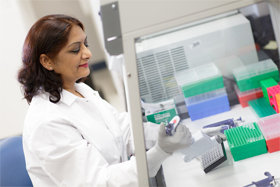 Jatinder Lamba, Ph.D., M.Sc., an associate professor of pharmacotherapy and translational research, led a multisite study that identified a genetic variation that may help clinicians target a deadly form of leukemia using a promising drug therapy. In a study published in the Journal of Clinical Oncology, researchers in the UF College of Pharmacy found that genetic variation within patients with CD33 — a surface molecule that acts as a receptor for drug therapy on a leukemia cell — can predict the effectiveness of the anti-leukemic drug gemtuzumab ozogamicin, or GO. Cancer cells with adequate CD33 allow GO to bind it and enter the cell, eventually killing it. Cells without CD33, or with altered CD33 due to genetic variation, will not respond to GO.
Jatinder Lamba, Ph.D., M.Sc., an associate professor of pharmacotherapy and translational research, led a multisite study that identified a genetic variation that may help clinicians target a deadly form of leukemia using a promising drug therapy. In a study published in the Journal of Clinical Oncology, researchers in the UF College of Pharmacy found that genetic variation within patients with CD33 — a surface molecule that acts as a receptor for drug therapy on a leukemia cell — can predict the effectiveness of the anti-leukemic drug gemtuzumab ozogamicin, or GO. Cancer cells with adequate CD33 allow GO to bind it and enter the cell, eventually killing it. Cells without CD33, or with altered CD33 due to genetic variation, will not respond to GO.- Yousong Ding, Ph.D., an assistant professor of medicinal chemistry, led a research team that found an edible, shaggy-looking mushroom contains a protein that is a potent killer of a certain leukemia cell. The Coprinus comatus mushroom killed human T-cell leukemia cells during laboratory tests. Its potency and ability to selectively target leukemia cells makes it a promising candidate for cancer treatment, according to findings published in the Proceedings of the National Academy of Sciences.
- Almut Winterstein, Ph.D., a professor and chair of pharmaceutical outcomes and policy, co-authored a study with UF Health researchers that found use of commonly prescribed antibiotic ear drops may increase the risk of a perforated eardrum after ear tube surgery. Insurance data from nearly 100,000 children were analyzed to identify eardrum perforations that require a costly surgical repair called tympanoplasty. UF researchers found that children receiving quinolone ear drops are 60 percent more likely to have eardrum perforations compared with children receiving neomycin ear drops. In addition, the study suggests that using quinolones together with steroids might further raise the risk of eardrum perforations.
Clinical Innovation
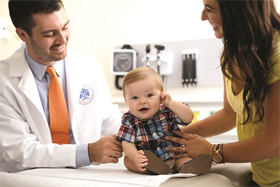 Pharmacists in the UF College of Pharmacy continue to identify innovative ways to advance clinical pharmacy practice and improve access for patients receiving primary care. Recognized as a national leader in developing interdisciplinary and collaborative practice agreements, the college sustained several shared-responsibility models with UF Health hospitals and piloted new programs in 2017. Highlighting this year’s activities were the following:
Pharmacists in the UF College of Pharmacy continue to identify innovative ways to advance clinical pharmacy practice and improve access for patients receiving primary care. Recognized as a national leader in developing interdisciplinary and collaborative practice agreements, the college sustained several shared-responsibility models with UF Health hospitals and piloted new programs in 2017. Highlighting this year’s activities were the following:
- One of the nation’s first outpatient pharmacogenomics consultation services launched in September at UF Health’s Internal Medicine Clinic at Tower Hill in Gainesville.
- A pilot program that helps former cancer patients manage their chronic pain medications launched in May 2017. The pharmacist collaborates with caregivers in advising patients taking multiple pain management prescriptions.
- UF College of Pharmacy and UF Health Cancer Center established a collaborative practice in September, with David DeRemer, Pharm.D., BCOP, FCCP, serving as a team-based clinician and assistant director of the cancer center’s Experimental Therapeutics Incubator Program.
The College of Pharmacy’s Center for Quality Medication Management underwent a name change in 2017, but remained the nation’s largest academically owned medication therapy management center. The center, with locations in Gainesville and Orlando, supports Medicaid and Medicare recipients by providing comprehensive medication reviews, adherence interventions and other telephonic outreach services to 650,000 unique patients a year. The CQM team has grown from 12 full-time employees in 2012 to more than 120 today. The center supports the college’s research and education missions by hosting a residency program and pharmacy students completing clinical rotations.
Faculty Excellence

The University of Florida College of Pharmacy has embarked on an aggressive campaign to recruit some of the brightest minds in pharmacy and science to join our team. Highlights include:
- The College has added 23 faculty since July 1, 2016. The additional faculty has helped the college improve the quality of education, secure more research funding and expand the clinical care we provide patients in our communities.
- Lance McMahon, Ph.D. joined the faculty as the new chair of Pharmacodynamics, following and extensive national search. During his 17-year tenure at UT Health San Antonio, he secured nearly $10 million in federal research funding and published more than 80 peer-reviewed journal articles. McMahon leads a highly integrative and collaborative department that spans the gap between cellular and systems pharmacology and physiology.
- Stephan Schmidt, Ph.D., F.C.P., an associate professor of pharmaceutics, was installed as the inaugural Certara Endowed Professorship in October.
UF College of Pharmacy faculty were recognized with many national and international awards in 2017. These honors reflect upon the outstanding scholars and educators at the college. A few of the national awards included:
- Joshua Brown, Ph.D., an assistant professor of pharmaceutical outcomes and policy, was selected as a TEDMED 2017 Research Scholar.
- Stacey Curtis, Pharm.D., a clinical assistant professor of pharmacotherapy and translational research, received the National Community Pharmacists Association Outstanding Faculty Liaison of the Year Award.
- Michelle Farland, Pharm.D., a clinical associate professor of pharmacotherapy and translational research, was presented the Emerging Teacher Scholar Award by the American Association of Colleges of Pharmacy.
- Julie Johnson, Pharm.D., dean and distinguished professor, was named a Clarivate Highly Cited Researcher of 2017 in pharmacology and toxicology.
- Eric Krause, Ph.D., an associate professor of pharmacodynamics, received the American Physiological Society Central Nervous System Section New Investigator Award.
- Hendrik Luesch, Ph.D., a professor and chair of medical chemistry, was awarded the Gold Medal Award for his presentation at the 2nd International Conference on Herbal and Traditional Medicine.
- Kalen Manasco, Pharm.D., BCPS, FPPAG, a clinical professor of pharmacotherapy and translational research, was selected as a Fellow of the American College of Clinical Pharmacy.
- Folakemi Odedina, Ph.D., a professor of pharmacotherapy and translational research, was presented the Living Legend Award from the Association for Good Clinical Practice in Nigeria.
- Stephan Schmidt, Ph.D., an associate professor of pharmaceutics, was named a Fellow of the American College of Clinical Pharmacology.
College of Public Health and Health Professions
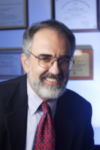
Michael G. Perri, Ph.D. Dean, College of Public Health and Health Professions
2018 marks the 60th anniversary of the founding of the College of Public Health and Health Professions, or PHHP. Six decades ago, the “College of Health Related Services” (as it was then known) charted a new course, becoming the first college of its kind housed in an academic health center. In 1958, the college opened its doors with 10 faculty and 15 students pursuing bachelor’s degrees in three programs (occupational therapy, physical therapy and medical technology).
Over the past 60 years, much has changed as the college broadened its educational offerings and expanded its mission to include education, research and service in public health as well the health professions. Today PHHP is home to more than 160 faculty and 2,300 students pursuing bachelors, master’s and doctoral degrees in 20 academic and professional programs. Over the past year, PHHP has continued to make strides in growing its enterprise in all spheres of its mission, and the accomplishments of our faculty have been recognized in an array of national and international awards. Highlights of PHHP accomplishments in education, research and service are presented below along with a selected list of faculty accolades.
Education
- The numbers of academic degrees awarded by PHHP has continued to rise. Over the past year, the college awarded 646 degrees, an 11 percent increase over the prior year. The largest increases were observed in the Bachelor of Health Science (254 to 287), Master of Public Health (66 to 83) and Doctor of Physical Therapy (63 to 73) programs.
- In the fall of 2017, PHHP launched an online Master of Science in Biostatistics program. The first class included 25 students recruited nationally and internationally.
- In June 2017, the Board of Governors approved PHHP’s request to offer the Doctor of Occupational Therapy degree, the first to be offered at a public university in the state of Florida. The inaugural class will enter in the fall semester of 2019.
- Drs. Gordon Mitchell and David Fuller, professors in the department of physical therapy, succeeded in attracting NIH funding for an interdisciplinary T32 training program in respiratory rehabilitation, titled “Breathing Research and Therapeutics.” PHHP now has a total of seven NIH-funded training programs, including five T32 pre- and postdoctoral training grants, one D43 Fogarty international training grant and one K-12 junior faculty training grant.
- During 2017, three programs in PHHP successfully achieved reaccreditation, including the Doctor of Audiology, the Master of Communication Sciences and Disorders, and the Clinical Psychology Internship programs.
- The latest U.S. News & World Report rankings revealed strong showings for our health professions programs compared with AAU peers: Physical Therapy, 3rd; Occupational Therapy, 6th; Health Care Management, 11th; Audiology, 15th; Speech-Language Pathology, 17th; and Clinical Psychology, 19th.
Research
- PHHP continues to climb in NIH funding among peer schools and is ranked 9th in NIH funding among public universities. Compared with the 2016 academic year, awards from NIH rose from $18.6 million to $20.9 million, and total grant funding grew from $30.1 million to $35.4 million.
- During the interval since initial accreditation as a school of public health in 2009, PHHP has demonstrated strong growth in its research portfolio. NIH funding has risen from $7.6 million in 2009 to $20.9 million in 2017, an increase of 268 percent. Similarly, total research awards have also grown substantially, rising from $16.3 million in 2009 to $35.4 million in 2017, an increase of 217 percent.
 A researcher team led by Dr. Ashish Deshmukh from the department of health services research, management and policy found that oral HPV infection rates are substantially higher in men than women and men are likely to be infected with the most dangerous strains of the virus. These findings have important health policy implications, particularly with regard to increasing the HPV vaccination rate among boys as well as girls.
A researcher team led by Dr. Ashish Deshmukh from the department of health services research, management and policy found that oral HPV infection rates are substantially higher in men than women and men are likely to be infected with the most dangerous strains of the virus. These findings have important health policy implications, particularly with regard to increasing the HPV vaccination rate among boys as well as girls.- The impact of the research conducted by the faculty and students of PHHP is evident in the stature of the journals in which our findings have been published. During the past academic year, findings from PHHP research studies have appeared in high-impact journals, including: the Annals of Internal Medicine, Circulation, JAMA Pediatrics, the Journal of the American College of Cardiology, The Lancet, The Lancet Neurology, The Lancet Oncology, Nature Genetics, and PNAS.
Service
 In collaboration with colleagues from the department of anesthesiology, Dr. Catherine Price from the department of clinical and health psychology recently launched the Perioperative Cognitive Anesthesia Network (PeCAN) program, which is housed in the UF Health Shands Presurgical Center. Dr. Price’s research has shown that among older adults certain preoperative markers of brain neuroanatomical and functional integrity are risk factors for negative postoperative cognitive outcomes, including acute cognitive decline, delirium and mortality. The interdisciplinary PeCAN team now evaluates these risk factors in a routine assessment of "cognitive vital signs" in adults 60 years and older. This collaborative effort represents an excellent example of translation from clinical research to clinical care.
In collaboration with colleagues from the department of anesthesiology, Dr. Catherine Price from the department of clinical and health psychology recently launched the Perioperative Cognitive Anesthesia Network (PeCAN) program, which is housed in the UF Health Shands Presurgical Center. Dr. Price’s research has shown that among older adults certain preoperative markers of brain neuroanatomical and functional integrity are risk factors for negative postoperative cognitive outcomes, including acute cognitive decline, delirium and mortality. The interdisciplinary PeCAN team now evaluates these risk factors in a routine assessment of "cognitive vital signs" in adults 60 years and older. This collaborative effort represents an excellent example of translation from clinical research to clinical care.- Together with the other HSC colleges (and led by the College of Dentistry), PHHP supported and participated in the Robert Wood Johnson – UF Summer Health Professions Education Program. This highly innovative program provided minority youth with a monthlong experience exposing them to careers in the health professions.
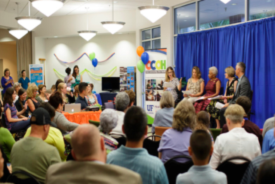 Our Community, Our Health, or OCOH, an initiative launched by HealthStreet, uses a town hall meeting format to facilitate two-way communication between the community and researchers. OCOH is a vehicle to share ideas about priorities for health research, a way to communicate research findings, and a way to blend ideas for research from multiple stakeholders across the country. Each event has both a physical audience and people from various locations across the county tuning in via livestream for a presentation by a health expert, followed by a question-and-answer session with community residents. Key topics addressed in 2017 included:
Our Community, Our Health, or OCOH, an initiative launched by HealthStreet, uses a town hall meeting format to facilitate two-way communication between the community and researchers. OCOH is a vehicle to share ideas about priorities for health research, a way to communicate research findings, and a way to blend ideas for research from multiple stakeholders across the country. Each event has both a physical audience and people from various locations across the county tuning in via livestream for a presentation by a health expert, followed by a question-and-answer session with community residents. Key topics addressed in 2017 included:- “Food Insecurity: A National Town Hall”
- “Opioids: A Crisis Facing Our Communities”
- “Everything You Wanted to Know about the Zika Virus”
- “The HPV Vaccine: Taking a Shot Against Cancer”
- “Addressing the Stigma: Intersections between HIV and Substance Abuse”
- In March of 2017, UF hosted the Advances in Skeletal Muscle Biology in Health Disease Conference, which was attended by 315 scientists representing institutions from 14 countries. The conference featured 35 presentations on topics related to muscle disease, muscle size, muscle function and muscle metabolism. The conference was sponsored by the Neuromuscular Plasticity T32 training grant; the Departments of Physical Therapy, Applied Physiology and Kinesiology, and Pharmacology; the colleges of Public Health and Health Professions, Health and Human Performance, and Medicine; and the Myology Institute.
Selective Accolades Earned by PHHP Faculty in 2017
- Joel Bialosky, Ph.D., P.T., a clinical associate professor in the department of physical therapy, received the James A. Gould Excellence in Teaching Orthopaedic Physical Therapy Award from the American Physical Therapy Association.
- Somnath Datta, Ph.D., a professor in the department of biostatistics, was elected president of the International Indian Statistical Association.
- David Fedele, Ph.D., an assistant professor in the department of clinical and health psychology, received the Routh Early Career Award from the Society of Pediatric Psychology of the American Psychological Association.
- Joanne J. Foss, Ph.D., OTR/L, and Emily S. Pugh, M.A, OTR/L, from the department of occupational therapy, received the Roster of Fellows award from the American Occupational Therapy Association.
- Peter Lang, Ph.D., a graduate research professor in the department of clinical and health psychology received the International Union of Psychological Science’s Lifetime Career Award.
- Ira Longini, Ph.D., a professor in the department of biostatistics, received the Aspen Institute Italia Award for scientific research.
- Arch (Chip) Mainous III, Ph.D., chair of the department of health services research, management and policy, received the Distinguished Mentor Award from the North American Primary Care Research Group.
- Tara Sabo-Attwood, Ph.D., chair of the department of environmental and global health, was elected president of the Southeastern Society of Toxicology and appointed as a research associate of the Smithsonian Institution.
- Yan Wang, PhD, a research assistant scientist in the department of epidemiology, received the Matilda White Riley Early Stage Investigator Honor from the NIH Office of Behavioral and Social Sciences Research.
College of Veterinary Medicine
 James W. Lloyd, D.V.M., Ph.D.
Dean, College of Veterinary Medicine
James W. Lloyd, D.V.M., Ph.D.
Dean, College of Veterinary Medicine
Administration
Under the leadership Dean Jim Lloyd, the College of Veterinary Medicine has continued to be actively engaged in strategic management, identifying and implementing new initiatives that will propel the college toward preeminence across all areas of its mission — teaching, research and clinical service.
The college continues to communicate with a wide group of stakeholders, both internal and external, to fine-tune ways in which it can better meet the needs of its many constituents, including alumni, donors, the practicing veterinary medical community and owners of animal patients seen and treated through the UF Veterinary Hospitals. We have made improvements to the structure of our Alumni Association to facilitate greater engagement with the college, and our Night in the Swamp program continues to offer continuing education to veterinarians in the state, enhancing these relationships and providing a win-win for us and for the practitioner community. In a major administrative development, we restructured our academic departments to better support our growing faculty. This change consisted of adding the department of comparative, diagnostic and population medicine as our fifth department, and changing the name and focus of the department of infectious diseases and pathology to infectious diseases and immunology.
We were pleased to hire Dr. Juan Samper as our new associate dean for academic and student affairs, and recently announced the appointment of Dr. Julie Moore as chair of our department of infectious diseases and immunology. In addition, we have made another key hire with the appointment of Katie Boudreau as our new senior director of development and advancement.
As Hurricane Irma approached Florida in early September, different groups within the college rallied to provide assistance to pet owners, veterinarians and animals of many species throughout the state. Responses began with preparations prior to the storm, and continued during and after it with administration, faculty, staff and students involved in various aspects of the collective effort.
The UF Veterinary Hospital provided continual 24/7 emergency services before, during and immediately after Hurricane Irma to pets, horses and wildlife, serving as a valuable patient care resource in light of closures of nearly every other veterinary specialty and emergency hospital in the state. Sept. 11, the day Irma swept through North Central Florida, was one of the busiest 24-hour periods in the history of the Small Animal Hospitals intensive care unit.
In addition, the UF Veterinary Emergency Treatment Service, the college’s disaster response and technical rescue team — which deploys at the request of the Florida Department of Agriculture and Consumer Services or area agencies and works closely with the Florida Veterinary Medical Association — carried out several different actions relating to the storm, including spending a week in the Florida Keys, providing patient care and situational assessments relating to animals and veterinary medical practices damaged by the storm.
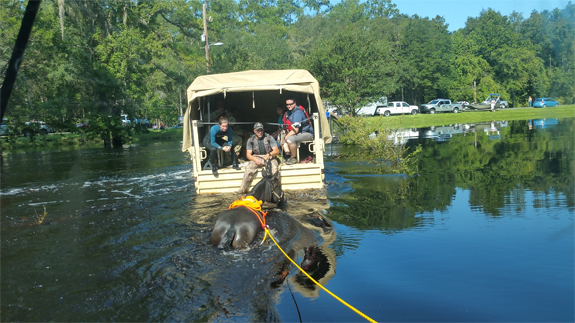
Research
Continuing the success of last year, in which the college increased its extramural funding by 76 percent, our faculty once again significantly increased our extramural research award level by nearly 20 percent, to over $22.6 million. Importantly, our faculty took the lead on two large collaborative multi-college, multi-institutional and multimillion-dollar grants, one in neuro-respiration, funded by the National Institutes of Health, and the other in malaria, funded by the Centers for Disease Control and Prevention. Last year, the college expanded its graduate program from two to five online M.S. programs, resulting this year in an increase from 235 to 708 enrolled online students. This is in addition to our 58 on-campus graduate students (15 M.S. and 43 Ph.D. degree-seeking.) Of the 12 students entering our graduate program this year, three already have an M.S. degree and eight a D.V.M. degree. Furthermore, the college initiated its recruiting for two new Resident-M.S. programs (oncology and dermatopathology) in our department of small animal clinical sciences. The college has continued its active hiring of new research faculty critical to our research enterprise, both basic and clinical scientists, including Dr. Salvatore Frasca, an aquatic infectious disease pathologist, hired under the university’s Preeminence Initiative.
Education
As of December 2017, 445 students were enrolled in the college’s fully-accredited D.V.M. program and 766 (58 traditional and 708 online students) were pursuing graduate degrees. In addition, the college currently offers advanced clinical training to 59 residents, 12 interns and one fellow through the UF Veterinary Hospitals. The college’s new Clinical Skills Teaching Laboratory, which celebrated its two-year anniversary in August, recently received the top design-build award in the education category in a statewide competition sponsored by a leading design-build group.
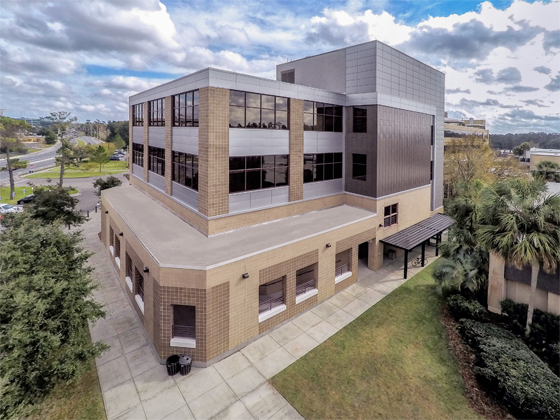
As the result of a unique collaboration with SynDaver Labs, UF veterinary medical students are now implementing some of the most advanced technology in the world. In late 2016, the first-ever synthetic canine cadavers were launched in a student surgery course. The technology, developed by Syndaver in collaboration with UFCVM small animal surgeons and executive director, consists of true-to-life models that provide an alternative to the use of canine cadavers in teaching. We are in the process of developing additional models to aid in student instruction.
We launched an exciting new shelter medicine clerkship in collaboration with Miami-Dade Animal Services, sending our first students to the MDAS shelter this fall. This new arrangement provides a valuable presence for the college in this vital area of the state and allows our students the ability to gain experience caring for animals in a large urban shelter facility. In addition, the PetSmart Charities mobile surgery/spay neuter vehicle is now out visiting and supporting shelters and adoption groups in North Central Florida.
Patient Care
The UF Veterinary Hospitals made significant progress in many of the goals articulated in the past two years through our strategic planning process. These goals include enhancing the hospital’s reputation in specialty services, improving its operational model, enhancing communication to referring veterinarians, maximizing student learning opportunities and investing in the staff, house officers and faculty. The college continues to expand the clinical trials program and is actively pursuing accreditation of its diagnostic laboratories through the American Association of Veterinary Laboratory Diagnosticians.
The Night in the Swamp outreach program, which provides regional veterinary medical associations with continuing education over dinner, continues to thrive. Since the program’s inception three years ago, we have held 45 events held at 22 VMAs in Florida, greatly increasing our college’s visibility and provided a needed service to the veterinary medical community.
A new EMR portal has been established to allow referring veterinarians to see discharge orders, lab tests and diagnostic images. Automatic electronic notification is sent to the referring veterinarian when a patient is admitted, discharge and dies, delivering timely relevant data. Operationally the Veterinary Hospitals improved clinical efficiency and customer services in the call center, reception area and pharmacy. Additional staff have been hired to help leverage doctor time and enhance the patient’s experience.
UF Veterinary Hospitals continues to expand the Patient Quality and Safety program in collaboration with the UF College of Medicine. This is the first program in the nation to use advanced software to track patient-related events and provide a framework for enhancing patient care. During the last year, the team has focused on developing awareness and changing the culture within the hospitals.
Overall hospital caseload continues to grow. Clinical service net revenue for the UF Veterinary Hospitals grew by 13.7 percent in FY 2017. Our caseload consisted of 36,616 in-hospital patients, including large and small animals, and in addition, 36,227 farm animals were treated in FY 2017. UF Pet Emergency Treatment Services in Ocala saw a net revenue increase of 11.5 percent and an overall caseload increase of 6.8 percent, with 5,954 patients.
In addition, we completed a major expansion project at UF PETS this fall, adding 2,500 square feet to the existing 5,200-square-foot facility and enabling us to better accommodate the growing caseload.
Development
This past fiscal year marked yet another strong year for fundraising in the College of Veterinary Medicine — raising $34,324,180 in charitable gifts. Support from friends of the college, which include grateful clients, contributed significantly to this success. The Dean's Circle of Excellence continues to grow, having now raised $2,451,483, an increase of 8.45 percent over the previous year. Our Scholarship Initiative, a key college initiative to reduce student debt load, already has amassed $19,500,000 in cash, pledges and estate commitments.
2017 was indeed another extraordinary year. It is humbling and awe-inspiring to consider the extraordinary achievements of the UF colleges that are such an essential part of UF Health. Next week we will profile our UF Health hospitals and our research centers and institutes. Here’s to continued success in 2018!
Power of Together, David S. Guzick, M.D., Ph.D. Senior Vice President for Health Affairs, UF President, UF Health
About the author
